Table of Contents
- 1. How to become an underwater welder
- 2. Educational and Certification Requirements
- 3. Gaining Experience and Skills
- 4. Underwater Welding Schools
- 5. Role and Responsibilities of an Underwater Welder
- 6. Tips for Advancement and Success
- 7. Top Skills Required
- 8. Career Advancement and Decision Making
- 9. Maintaining Proficiency and Longevity in the Field
- 11. Learning from Industry Experts
- 12. Building a Professional Network
- 13. Staying Updated with Industry Trends
- Conclusion
- FAQs
Get ready for an epic journey below the surface! Discover the untold secrets of underwater welding that will leave you hooked and craving the thrill of this incredible career path.
Becoming an underwater welder can be an exciting and rewarding career choice. In this guide, we will walk you through the steps to pursuing this unique profession. From acquiring the necessary training and certifications to understanding the challenges and opportunities, we’ll cover it all. So, let’s dive in!
1. How to become an underwater welder
Becoming an underwater welder opens doors to a profession that blends technical expertise with the thrill of underwater exploration. To get ahead in this field, you need a specific set of skills, qualifications, and experiences. It is both difficult and fulfilling.
- The Role of an Underwater Welder: Underwater welders are trained workers who fix, build, and take care of structures in water. Their tasks range from fixing offshore rigs and pipelines to working on ships, dams, and various underwater infrastructure. The role requires precision welding in conditions that are markedly different from traditional welding environments, presenting both physical and technical challenges.
- Why Pursue This Career: The allure of becoming an underwater welder lies in its blend of adventure, technical skill, and the opportunity to work in unconventional environments. This career path offers a chance to explore the depths of the ocean while utilizing specialized welding techniques, making a tangible impact on critical underwater structures worldwide.
- Challenges and Rewards: The path to becoming an underwater welder is demanding. It requires a dedication to mastering welding techniques, obtaining diving certifications, and undergoing rigorous training. However, the rewards are substantial, with competitive salaries and the thrill of working in environments few have the opportunity to experience.
- The Journey Ahead: Embarking on this career journey involves a series of steps, each crucial in shaping a successful underwater welding career. From educational prerequisites to specialized training and gaining valuable experience, each stage of the process lays the foundation for a fulfilling and challenging career as an underwater welder.
This section sets the stage for understanding the uniqueness and challenges of the profession, highlighting the reasons to pursue it while outlining the journey ahead for aspiring underwater welders.
2. Educational and Certification Requirements
Becoming an underwater welder necessitates a blend of educational milestones and specialized certifications. The journey begins with laying a sturdy foundation through education and progresses to acquiring essential certifications relevant to both welding and commercial diving.
- High School Diploma or GED: The first step towards this career path is securing a high school diploma or its equivalent, such as a GED (General Educational Development) certificate. This educational foundation forms the basis for further specialized training and certifications.
- Welding Certification: Earning a welding certification is paramount. This involves completing a welding program from an accredited institution or trade school. These programs equip aspiring welders with the necessary skills in various welding techniques, including arc welding, TIG (Tungsten Inert Gas) welding, and MIG (Metal Inert Gas) welding, among others.
- Commercial Diving Certification: In addition to welding expertise, acquiring certification as a commercial diver is fundamental. Commercial diving schools offer comprehensive training programs that cover underwater safety protocols, diving techniques, equipment operation, and emergency procedures. These certifications are imperative for safe and efficient operations in aquatic environments.
- The Synergy of Education and Certification: The combination of welding expertise and commercial diving certifications forms the bedrock of competence required in this field. These qualifications not only validate an individual’s capabilities but also ensure they have the necessary knowledge and skills to work effectively in challenging underwater conditions.
- Continued Learning and Advancements: Beyond initial certifications, continuous learning and skill refinement are integral to staying abreast of evolving technologies and techniques in both welding and diving. Pursuing advanced certifications and staying updated with industry standards is essential for career growth and ensuring safety in this demanding profession.
This section emphasizes the educational prerequisites and certifications crucial for aspiring underwater welders. It highlights the need for a strong educational foundation in welding and commercial diving to successfully navigate the challenges of this unique profession.
3. Gaining Experience and Skills
Becoming proficient as an underwater welder demands a diverse skill set acquired through practical experience and specialized training. Mastery of welding techniques and underwater operations is essential for success in this challenging field.
- Experience in Welding: After obtaining formal education and certifications in welding, gaining hands-on experience is critical. Working in surface welding jobs allows aspiring underwater welders to hone their skills, perfect welding techniques, and understand the nuances of different welding environments.
- Diving Skills Acquisition: Transitioning from surface to underwater welding requires a comprehensive understanding of diving techniques and safety protocols. Engaging in diving experiences, both in controlled environments and open water, allows individuals to acclimatize to underwater conditions and become proficient in handling various diving equipment.
- Specialized Underwater Skills: Beyond traditional welding and diving competencies, specialized underwater skills are essential. This includes mastering techniques specific to underwater welding, such as managing buoyancy, handling equipment in low-visibility conditions, and executing welds effectively in a marine environment.
- Safety and Problem-solving Proficiency: Underwater welders must be adept at problem-solving and maintain a sharp focus on safety. The ability to troubleshoot underwater challenges, adapt to changing conditions, and prioritize safety protocols is crucial for successful outcomes in this high-risk environment.
- Continuous Training and Skill Development: Continuous training and skill enhancement are indispensable in this field. Regularly participating in workshops, advanced training programs, and staying updated with industry best practices not only refines existing skills but also introduces new techniques and technologies vital for professional growth.
This section underscores the significance of practical experience, diving proficiency, and specialized underwater skills necessary for aspiring underwater welders. It emphasizes the importance of continuous skill development and safety awareness, which are essential for success in this demanding profession.
4. Underwater Welding Schools
Attending specialized underwater welding schools is a crucial step for aspiring professionals in this field. These institutions offer focused training programs that bridge the gap between welding expertise and underwater operations, preparing individuals for the unique challenges of underwater welding.
- Importance of Underwater Welding Schools: Underwater welding schools provide comprehensive training tailored to the demands of working in submerged environments. These programs combine theoretical knowledge with practical, hands-on experience, emphasizing safety protocols, specialized welding techniques, and underwater operations.
- Curriculum and Training Modules: The courses offered by underwater welding schools encompass a wide spectrum of subjects. These include welding in underwater conditions, diver safety, underwater cutting techniques, equipment handling, and emergency response procedures. The curriculum is designed to equip students with the specific skills needed for success in this niche profession.
- Practical Experience and Simulations: Hands-on training in controlled underwater environments or simulated conditions is a hallmark of these schools. Students get the opportunity to apply theoretical knowledge in real-life scenarios, practicing welding techniques, managing equipment, and troubleshooting challenges they might encounter in actual underwater settings.
- Certifications and Industry Standards: The completion of programs in reputable underwater welding schools often leads to certifications recognized by industry standards. These certifications validate an individual’s competence and adherence to safety and operational protocols, enhancing employability and credibility within the field.
- Choosing the Right School: Selecting an accredited and reputable underwater welding school is crucial. Factors such as curriculum depth, experienced instructors, available facilities, and post-graduation support must be considered when making this pivotal choice.
- Post-School Opportunities and Networking: Apart from training, these schools often provide avenues for networking and career placement. Alumni networks, industry connections, and career guidance can significantly assist graduates in securing employment and advancing their careers in underwater welding.
This section highlights the significance of specialized underwater welding schools in honing the skills and expertise required for success in the underwater welding profession. It emphasizes the comprehensive training, practical experience, and industry certifications offered by these institutions, which are pivotal for aspiring underwater welders.
5. Role and Responsibilities of an Underwater Welder
Understanding the role and responsibilities of an underwater welder provides insight into the challenges and contributions within this unique profession. This section delves into the core tasks and expectations encountered by individuals pursuing a career in underwater welding.
- Repair, Construction, and Maintenance: In order to build, maintain, and repair a variety of underwater structures, underwater welders are essential. Pipelines, ships, offshore platforms, dams, and other submerged infrastructure necessary for the oil and gas, maritime, and civil engineering sectors are examples of this.
- Precision Welding in Challenging Environments: The primary responsibility of an underwater welder involves executing precision welds in conditions markedly different from conventional welding environments. Working in confined spaces, often with limited visibility and under high-pressure conditions, demands exceptional skill, focus, and adaptability.
- Adherence to Safety Protocols: Safety is paramount in underwater welding. Professionals in this field must adhere to stringent safety protocols to mitigate the risks associated with underwater work. Understanding and implementing safety measures for both diving and welding operations is crucial to ensuring personal safety and the integrity of the structures being worked on.
- Collaboration and Communication: Effective collaboration and communication are essential skills for underwater welders. Working as part of a team, often with divers, engineers, and project managers, requires clear communication and coordination to execute tasks efficiently and safely.
- Continuous Learning and Adaptability: The dynamic nature of underwater welding necessitates adaptability and a commitment to continuous learning. Keeping abreast of technological advancements, new welding techniques, and safety protocols is crucial for professional growth and ensuring work efficacy.
- Environmental Impact Consideration: Underwater welders also play a role in environmental conservation by ensuring that their work minimizes adverse effects on aquatic ecosystems. This includes employing techniques that reduce environmental impact and adhering to regulations to preserve marine habitats.
This section sheds light on the multifaceted role of an underwater welder, emphasizing the precision, safety, collaboration, and adaptability required to navigate the challenges and responsibilities within this demanding profession.
6. Tips for Advancement and Success
Advancing in the field of underwater welding requires a strategic approach, continual skill development, and a proactive attitude towards career progression. Here are essential tips and strategies for aspiring underwater welders to achieve success and advancement in their careers:
- Continuous Education and Training:
- Stay updated with the latest welding techniques, equipment, and safety protocols through ongoing education and training programs.
- Pursue advanced certifications to enhance expertise and credibility within the industry.
- Diversify Skill Set:
- Expand your expertise beyond welding by acquiring additional certifications in related fields such as inspection, non-destructive testing, or specialized underwater photography and videography.
- Gain Diverse Experience:
- Seek opportunities to work in various underwater environments and on different structures to diversify experience and enhance adaptability.
- Network and Build Relationships:
- Engage with industry professionals, join relevant associations, and participate in conferences or workshops to network and stay updated with industry trends and opportunities.
- Prioritize Safety:
- Maintain a strict focus on safety protocols and best practices to ensure personal safety and the integrity of underwater structures.
- Seek mentorship and guidance.
- Connect with experienced professionals in the field for mentorship and guidance, benefiting from their insights and advice for career growth.
- demonstrate reliability and professionalism.
- Showcase reliability, professionalism, and a strong work ethic to establish a positive reputation within the industry.
- Stay adaptable and open to challenges.
- Embrace challenges as opportunities for growth, staying adaptable to new technologies and methodologies within the field.
- Plan for Career Progression:
- Set clear career goals and develop a strategic plan for advancement, considering opportunities for leadership roles or specializations.
- Maintain Work-Life Balance:
- Prioritize mental and physical well-being by maintaining a healthy work-life balance to ensure sustained success in the field.
Implementing these tips and strategies can significantly contribute to the advancement and success of aspiring underwater welders, fostering career growth and excellence within this specialized profession.
7. Top Skills Required
Mastering the art of underwater welding demands a blend of technical expertise, specialized skills, and personal attributes. Here are the top skills crucial for success in this challenging profession:
- Welding Skills:
- Proficiency in various welding techniques, including arc welding, TIG welding, and MIG welding, to execute precise and durable welds in underwater conditions
- Diving Skills:
- Competence in diving techniques, buoyancy control, and underwater navigation to maneuver effectively while performing welding tasks
- Underwater Cutting Skills:
- Mastery in using cutting tools underwater for metal preparation and repair, such as oxy-acetylene torches or hydraulic tools.
- Inspection and Non-Destructive Testing Skills:
- Ability to conduct inspections and non-destructive testing to assess weld quality and structural integrity underwater.
- Underwater Photography and Videography Skills:
- Skill in capturing visual documentation of underwater structures and welding activities for inspection and record-keeping purposes.
- Communication Skills:
- Clear communication and effective teamwork to collaborate with fellow divers, engineers, and project managers during complex underwater operations
- Analytical Skills:
- Analytical thinking is needed to troubleshoot challenges and make quick decisions in dynamic and often unpredictable underwater environments.
- Problem-Solving Skills:
- Adaptive problem-solving abilities to address unexpected situations or complications that may arise during underwater welding tasks
- Creativity:
- Innovative thinking to adapt traditional welding techniques to the unique constraints of underwater environments.
- Interpersonal Skills:
- Strong interpersonal skills are needed to build rapport within teams, convey ideas effectively, and foster a collaborative work environment.
Developing and honing these skills is paramount for aspiring underwater welders, as they form the foundation for success and proficiency in this specialized and demanding field.
8. Career Advancement and Decision Making
Advancing in the field of underwater welding requires strategic decision-making and a clear vision for career progression. Here’s an in-depth look at the pathways and considerations for those seeking advancement in this specialized profession:
- Advanced Certifications and Specializations:
- Pursue advanced certifications and specializations in areas such as inspection, project management, or specialized welding techniques to enhance expertise and competitiveness in the field.
- Leadership Roles and Supervisory Positions:
- Aim for leadership roles that involve supervising underwater welding projects or managing teams, leveraging experience and expertise to guide others.
- specialized niche expertise:
- Consider specializing in niche areas such as underwater pipeline welding, offshore platform maintenance, or specific marine structures to become an expert in a particular field.
- Entrepreneurial Ventures:
- Explore entrepreneurial opportunities by starting a consulting firm, offering specialized services, or providing training in underwater welding techniques.
- Industry Research and Development:
- Engage in research and development within the industry, contributing to the advancement of underwater welding technologies or safety protocols.
- Geographical Considerations:
- Assess opportunities in different geographical locations, as regions with specific underwater infrastructure needs may offer unique career prospects.
- Long-Term Career Planning:
- Develop a long-term career plan, setting milestones and goals to guide career progression and ensure a focused approach to advancement.
- Networking and Industry Involvement:
- Stay active within the industry by networking, participating in professional associations, and attending conferences to remain updated with industry trends and opportunities.
- Continuing Education and Skill Enhancement:
- Prioritize continuous education and skill enhancement to stay abreast of technological advancements and remain competitive in the evolving field.
- Work-Life Balance and Sustainability:
- Consider the importance of work-life balance and sustainability in the long run, ensuring a fulfilling and sustained career in underwater welding.
Careful consideration of these pathways and factors can aid underwater welders in making informed decisions and charting a successful trajectory towards career advancement within this challenging yet rewarding profession.
9. Maintaining Proficiency and Longevity in the Field
Sustaining success as an underwater welder involves continual skill maintenance, adapting to industry changes, and fostering a sustainable career. Here’s a comprehensive guide to maintaining proficiency and ensuring longevity in this specialized field:
- Continuing Education and Training:
- Engage in continuous learning through workshops, seminars, and advanced training programs to stay updated with the latest welding techniques, equipment, and safety protocols.
- Skill Refinement and Practice:
- Regularly practice welding techniques, both underwater and on the surface, to maintain proficiency and finesse in executing precise and durable welds.
- Equipment Familiarization and Upgrade:
- Stay familiar with and adapt to new welding equipment and technologies, ensuring proficiency in handling advanced tools used in underwater welding.
- Refresher Courses and Recertification:
- Periodically undergo refresher courses and recertification to reinforce existing skills and demonstrate adherence to industry standards.
- Networking and Collaboration:
- Maintain professional relationships and collaborations within the industry to exchange knowledge, share experiences, and stay informed about emerging trends and best practices.
- Safety Prioritization:
- Continue prioritizing safety measures and protocols during underwater operations, fostering a safety-conscious work ethic to mitigate risks.
- Physical and mental well-being:
- Prioritize physical fitness and mental well-being to ensure endurance and focus during demanding underwater welding tasks.
- Adaptability and Flexibility:
- Remain adaptable to changes in the industry, including advancements in technology and shifts in project requirements, to sustain relevance and competitiveness.
- Documentation and record-keeping:
- Maintain comprehensive records of work, including weld logs and underwater inspection reports, ensuring accuracy and adherence to quality standards.
- Career Reflection and Goal Setting:
- Reflect on career achievements and challenges periodically, setting new goals and objectives to continue progressing in the field.
By focusing on continual skill enhancement, safety consciousness, adaptability, and personal well-being, underwater welders can ensure a sustainable and fulfilling career, maintaining proficiency and longevity in this dynamic profession.
11. Learning from Industry Experts
Connecting with experienced underwater welders and industry experts is invaluable for gaining insights into the profession. Attend industry conferences, join professional organizations, and participate in workshops and training programs to expand your knowledge and network. Learning from those who have established successful careers as underwater welders will provide you with guidance and mentorship throughout your journey.
12. Building a Professional Network
Building a strong professional network is essential for career growth. Connect with fellow divers, welders, and professionals in the maritime industry through online platforms, industry events, and trade associations. Networking can lead to job opportunities, collaborations, and access to valuable resources. Engage in meaningful conversations, share your experiences, and be open to learning from others.
13. Staying Updated with Industry Trends
The field of underwater welding is continually evolving with advancements in technology and industry practices. Stay updated with the latest trends, equipment, and techniques by subscribing to industry publications, following relevant blogs and forums, and attending workshops and conferences. Remaining informed and adaptable will ensure you stay competitive in the ever-changing job market.
Conclusion
Becoming an underwater welder requires dedication, a combination of welding and diving skills, and a passion for the underwater world. By following the outlined steps in this guide, you can embark on a fulfilling career that allows you to work in unique and challenging environments. Remember, continuous learning, networking, and adaptability are key to thriving as an underwater welder. So, start your journey today and explore the depths of possibility!
FAQs
How do I start a career in underwater welding?
Start by earning a high school diploma or GED, then pursue welding certification and gain experience. Obtain commercial diving certification and attend specialized underwater welding schools.
What qualifications do I need?
A high school diploma or GED, welding certification, commercial diving certification, and specialized training from underwater welding schools are essential.
How long does it take to become an underwater welder?
The timeline varies, but it typically involves several years of education, certification, and gaining practical experience, which can range from 1 to 5 years.
What are the main challenges of this career?
Working in challenging underwater conditions, ensuring safety in high-pressure environments, and mastering precision welding techniques are some of the primary challenges.
What skills are crucial for success?
Skills in welding techniques, diving proficiency, problem-solving, communication, and adaptability are vital for success as an underwater welder.
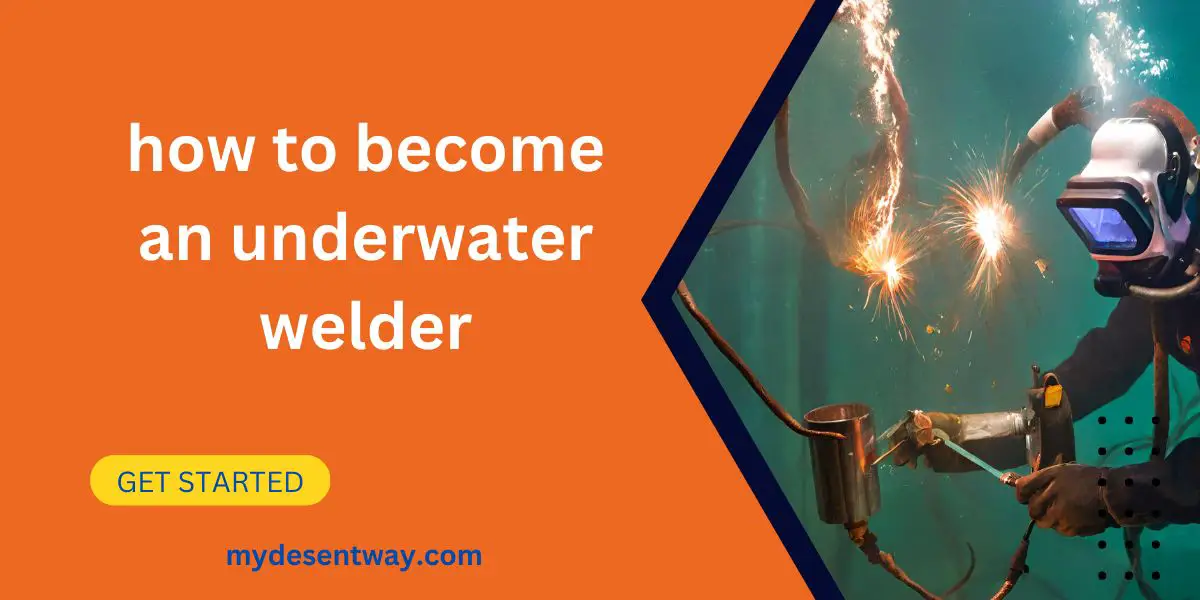
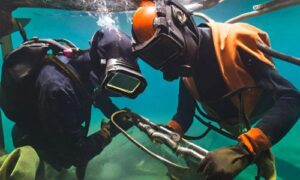
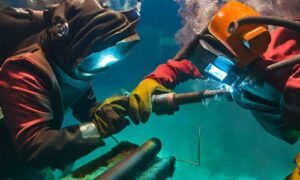
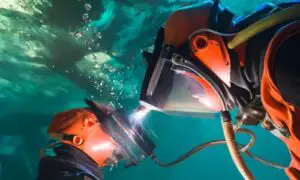
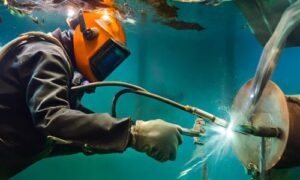
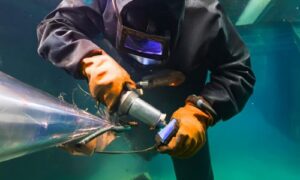
5 thoughts on “How to Become an Underwater Welder: The Ultimate Guide”